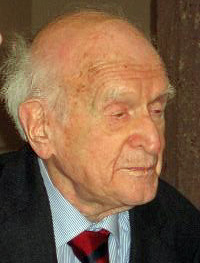Hans Keilson facts for kids
Quick facts for kids
Hans Keilson
|
|
|---|---|

Hans Keilson in 2007
|
|
| Born | Hans Alex Keilson 12 December 1909 Bad Freienwalde, Germany |
| Died | 31 May 2011 (aged 101) Hilversum, Netherlands |
| Occupation | Medic, psychiatrist, psychoanalyst, writer |
| Language | Dutch, German |
| Nationality | German |
| Citizenship | Dutch |
| Period | 1933–2011 |
| Subject | World War II |
| Notable awards | Knighthood of the Order of Orange-Nassau |
| Spouse | Gertrud Manz (1930's–1969) (her death) Marita Lauritz (1970–2011) (his death) |
| Children | Barbara (1941), Bloeme (1974) |
Hans Alex Keilson (12 December 1909 – 31 May 2011) was a German-Dutch writer, poet, and a special kind of doctor who helps people with their thoughts and feelings (a psychoanalyst and child psychologist). He was famous for his books about World War II, especially since he was part of the Dutch resistance during the war.
Hans Keilson worked with children who had been through very difficult times, often because of the war. Because of this, many of his stories were about the lasting effects of war. His first book came out in 1934, but most of his well-known works were published after the war ended. In 2010, a writer from The New York Times newspaper, Francine Prose, called Keilson "one of the world's greatest writers." This was a huge honor, especially since he was 101 years old at the time!
Contents
About Hans Keilson
Early Life and Moving to the Netherlands
From 1928 to 1934, Hans Keilson studied the science of medicines in Berlin, Germany. However, because of new laws against Jewish people working, he couldn't get a job in his field. Instead, he worked as a gym teacher in Jewish private schools. He also sometimes earned money by playing music. During this time, he met his first wife, Gertrud Manz, who studied handwriting.
In 1936, Hans and Gertrud had to leave Germany and move to the Netherlands. This was because of the dangerous situation for Jewish people in Germany. While living in the Netherlands, Keilson wrote some books in Dutch. He used a different name, Benjamin Cooper, to publish these works.
Life During World War II
In 1941, the war made things very dangerous, and Keilson had to go into hiding to stay safe. He had to leave his pregnant wife behind. His wife gave birth to their daughter, Barbara, that same year. To protect Barbara from danger, her mother pretended that a German officer was the father.
Meanwhile, Keilson moved in with a married couple in Delft. He took on a new identity, pretending to be a doctor named Dr. Van der Linden. During this time, the Dutch resistance asked him to visit Jewish children who had been separated from their parents because their parents were also hiding. These experiences with the children deeply inspired Keilson's later books.
After the war, Keilson was reunited with his wife and daughter. They had not been able to marry before the war because of the laws in Germany and the Netherlands. So, after the war ended, they finally got married in Amsterdam. Gertrud had to explain to their Dutch neighbors that her husband was German but also Jewish, to avoid any problems.
After the War and Later Family Life
To work as a doctor in the Netherlands, Keilson had to get his medical license again. He did this and then became a specialist in helping people with their thoughts and feelings, working as a psychiatrist and psychoanalyst. Sadly, in 1969, Gertrud, his first wife, passed away.
During the war, Keilson's parents were sent to a concentration camp called Auschwitz, where they sadly died. In later interviews, Keilson shared how much he regretted not being able to save his parents.
Later Years and Recognition
In 1970, Keilson married Marita Lauritz, who was a historian of literature. She was 25 years younger than him. In 1974, Marita gave birth to their daughter, Bloeme. Keilson continued to publish more books, but he didn't get much attention from the media for a while. On his special birthdays, like his 70th, 80th, and 90th, Dutch news would interview him.
In 2010, everything changed when Francine Prose from The New York Times newspaper called him "one of the world's greatest writers." This brought a lot of media attention to Keilson, both in the United States and in the Netherlands. People were amazed that he received such praise at 100 years old! Keilson was even invited to a popular Dutch TV talk show, De Wereld Draait Door, where he was interviewed. Many more articles and interviews about him appeared around the world. By then, his book Der Tod des Widersachers (which means "The Death of the Adversary") had been translated into 20 different languages.
Hans Keilson passed away on 31 May 2011, in Hilversum, Netherlands. He was 101 years old.
Awards and Honors
Hans Keilson received many important awards and honors throughout his life, including:
- Honorary citizen of his hometown, Bad Freienwalde
- Silver Medal from the International Federation of Resistance Fighters – Association of Anti-Fascists
- Honorary Doctorate from the University of Bremen
- Officer's Cross of the Order of Merit of the Federal Republic of Germany
- 1999 Hayman Prize for his work on children and adults who have experienced trauma, from the International Psychoanalytical Association
- 2005 Johann-Heinrich-Merck-Preis
- 2007 Moses Mendelssohn Medal
- 2008 Welt-Literaturpreis (a major literary award)
 | Sharif Bey |
 | Hale Woodruff |
 | Richmond Barthé |
 | Purvis Young |

